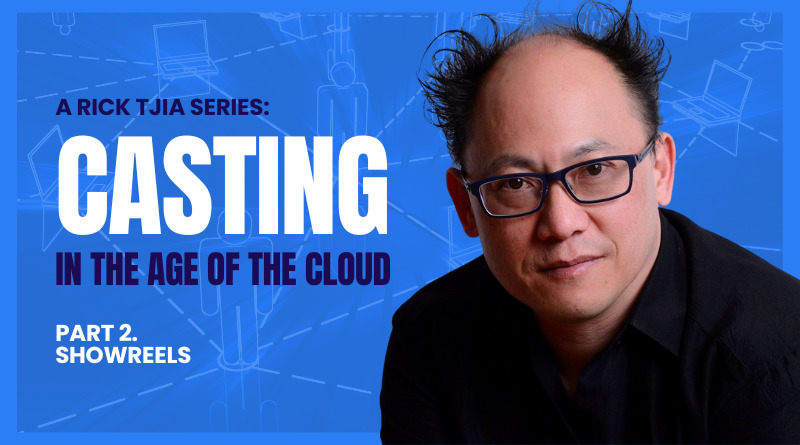Casting in the Age of the Cloud – Part 2: Showreels
It is simply an awesome question. It brings light to so many things and in so many situations. It pushes us to think, and hopefully before we act.
As we begin the subject of showreels, those of you who have read my opinion on them in the past already know how useless I find them. Those who don’t know me are usually perplexed by my opinion of showreels, especially since showreels have been such a staple of the entertainment industry for such a long time. How could I possibly find them useless? Most people don’t understand such a contrary stance. And yes, I do understand why they don’t understand. But the fact remains, they don’t understand.
Until we get together and ask that wonderful question, “Why?” Why do casting decision-makers ask dancers for a video? What is the purpose of an audition video in the first place?
In the past, I have written about live auditions, and I have written about the purpose of those auditions: namely, to see what you can do and how well you do it. It stands to reason that the purpose of an audition video is the same. And it is. No tricks—it is the same, albeit quite a bit less expensive for everyone involved.
Now, the evaluation of what a dancer can do and how they do it is contingent on evaluable parameters, and it is based upon these parameters that a hirer makes a decision. The most important of these are: technical level, rhythm, charisma, artistic interpretation, flexibility, musicality, directability, amount of experience, skill sets/versatility, your look, are you one of my friends, are you a friend of one of my friends.
This list answers the “why” and inadvertently the “what.”
Showcase your talent!
Complete your profile page and add your act or show to the pool of performers being considered for hire via our talent database.
Signing up and creating your profile is FREE!
Showreels are an amalgam of short clips (often one second or less) put together to make the prospect of working with you exciting. They quickly show what type of shows you have done, and with what big names you’ve worked with. But so does a CV. What a casting director doesn’t need is a video recap of your CV. Because, of course, you’ve already given him or her your CV. Showreels are also often characterized by a soundtrack overlay. So much for evaluating rhythm.
And if your main dance style is tap… once again, so much for evaluating rhythm. Rhythm which is, incidentally, the raison d’être of tap dancing. Without rhythm, there is no point to hoofing.
I won’t go through the entire list one by one, but I hope you get my point, that, in a nutshell, the only thing on this list that it is possible to see from a showreel is your look. But that can also be seen in the full-body or 3/4 photo that you are normally asked to submit with your video and CV.
So whereas the whole point of a live or video audition is to show what you really can do and how well you do it, the objective of a showreel is to hide it. To make you look more energetic, more exciting—more of every aspect of performing—than you really are.
So then, knowing this, and going back to the “Why” question, why are people still submitting showreels?
Oh yes, the confusion starts. Because not all clients are created equal. There are situations where the typical flashy showreel becomes pertinent, but it is for a particular clientele. For example, when a client wants to make a television ad, and it is designed to include a dancer or dancers and finally put into production, there is no guarantee that the producer and director assigned to the project will know anything about dance or about how dance works. They will be impressed by the flash of a showreel and will often make their choice just based on how excited the reel makes them feel.
So yes, despite everything I’ve just mentioned so far, there is some utility in showreels in certain situations. But it comes with a caveat. When you’ve got a client who is so easily excited by a video reel that doesn’t actually give a lot of information about the dancer’s actual dance ability, then one needs to be wary about how dancers on the gig are going to be managed. If they are willing to hire dancers off of a few flashy one-second clips in a showreel, then in production, will they know that dancers need time to warm up before performing? Will they know that dancing on a concrete floor is detrimental to a dancer’s body? Will they know that a three-foot square space is, in most cases, not enough room to dance full-out in?

As part of CircusTalk’s collaboration with JamarGig,a cutting-edge SaaS platform designed specifically for Casting Directors and Production companies, your CircusTalk profile now gets incredible additional exposure through the JamarGig platform to hundreds of casting directors and talent seekers across the performing arts industry. From our regularly updated Job Board and Career Lab Sessions to an assortment of professional advice articles and series, our website is an investment in your professional career. Join PRO today and ignite your career.
Looking for jobs, auditions, residency and grant opportunities?
CircusTalk PRO has got you covered!
Click here to access the CircusTalk Job Board!
Stay tuned for Part 3 of the series, Casting in the Age of the Cloud: Video Manipulation. This article was originally published at DanceInforma....
Do you have a story to share? Submit your news story, article or press release.






